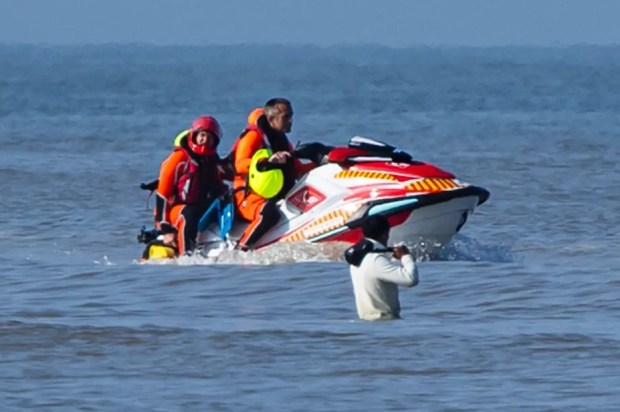In a bid to curb the rising number of migrants attempting to cross the Channel, French police have reportedly adopted a novel approach involving jet skis and nets. This tactic, which aims to safely stop migrant boats by jamming their propellers, was revealed ahead of French President Emmanuel Macron’s state visit to the UK this week.
The innovative method involves deploying nets from jet skis to bring dinghies to a halt in shallow waters. This approach is part of a broader trial that also saw police puncturing a migrant boat with a knife last Friday. These measures are expected to become a routine part of law enforcement activities in the coming weeks.
Strategic Summit and New Measures
During his upcoming visit, President Macron is set to discuss these strategies with UK Labour leader Sir Keir Starmer. The summit aims to enhance cooperation between the two nations in tackling illegal crossings. Home Secretary Yvette Cooper emphasized the importance of these efforts, stating, “Over the last few months, we have been working together on new ways to crack down on the criminal gang operations, with the French now bringing in important new tactics to stop boats that are in the water.”
The announcement comes as the number of migrants arriving in the UK by small boats this year surpasses 20,000, despite significant financial efforts by the UK government to address the issue.
Historical Context and Previous Proposals
This development follows earlier proposals by the UK government to employ jet skis in 2021. However, the idea of intercepting boats in British waters and redirecting them was deemed too hazardous. Other unconventional ideas discussed in the past included wave machines, floating barriers, and repurposing decommissioned oil platforms to house migrants.
Experts have criticized these proposals as impractical and potentially dangerous. Instead, they advocate for more sustainable solutions that address the root causes of migration.
Economic Factors and Bilateral Agreements
Meanwhile, the French government has pointed to the UK’s black market economy as a significant pull factor for migrants. In response, Yvette Cooper is exploring measures to crack down on illegal work in the UK.
Amidst these developments, discussions continue around a potential “one in, one out” deal that would allow for the return of Channel migrants to France in exchange for asylum seekers with family ties in the UK. This agreement remains under negotiation as President Macron’s visit approaches.
The number of people who have arrived in the UK by small boat this year has passed 20,000, despite £500 million handed to France to curb crossings.
Future Implications and Cooperation
The move represents a significant shift in Franco-British cooperation on border security. As these new tactics are implemented, both nations hope to see a decline in illegal crossings and a more controlled management of migration flows.
Looking forward, the success of these measures will likely depend on continued collaboration and the development of comprehensive policies that address both security and humanitarian concerns. As the situation evolves, the international community will be watching closely to see how these efforts unfold.
 French Police Use Jet Skis to Combat Migrant Crossings to Britain
French Police Use Jet Skis to Combat Migrant Crossings to Britain French Police Use Jet Skis to Halt Migrant Boats with New Tactics
French Police Use Jet Skis to Halt Migrant Boats with New Tactics Scottish Couple’s Tragic Loss Highlights Dangers of Tick-Borne Disease
Scottish Couple’s Tragic Loss Highlights Dangers of Tick-Borne Disease Exploring Identity Through Philosophy: A Review of Alexander Douglas’s Work
Exploring Identity Through Philosophy: A Review of Alexander Douglas’s Work Starmer Defends Reeves Amid Emotional Commons Moment and Market Jitters
Starmer Defends Reeves Amid Emotional Commons Moment and Market Jitters